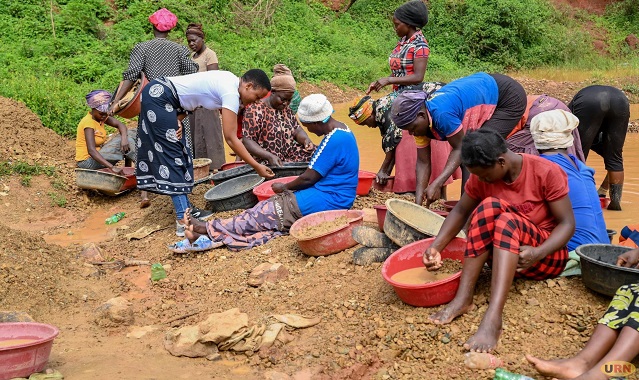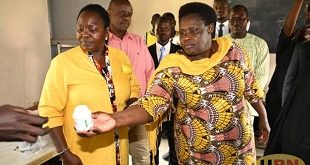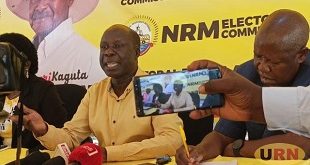
Kampala, Uganda | THE INDEPENDENT | The 2022 Mining Act for the first time recognized artisan miners as key players in the mining sector in Uganda.
Artisanal and small-scale mining (ASM) range from informal individual miners earning a subsistence livelihood to more formal and regulated small-scale entities producing minerals commercially.
The mining development program formerly known as the Directorate of Geological Surveys and Mines (DGSM) is required to formalize artisan miners and to grant them licenses to give them legal effect.
Uganda Radio Network has through interviews with artisan miners, and experts in mining policy and regulation discovered that almost two years since the law was assented to, the formalization of the artisan miners has not gone on as expected.
The challenges in the formalization drive according the interviews URN has conducted include the lack of awareness of the new law by artisan miners, local government officers, the rigorous requirements for one or a group of artisan miner to be registered, lack of financing among others.
Formalizing artisan miners involves integrating them into the legal and regulatory framework, ensuring compliance with safety and environmental standards among others.
With the Mining and Mineral Act 2022 in place , Uganda joined many countries have embarked on a quest for what seems to be some sort of Holy Grail: the formalization of the artisanal and small-scale mining (ASM) sector.
Many experts have call on the government to formalize artisan miners so as to integrate the sector into the formal economy, society and regulatory system. But for some this component of the law remain more on paper.
Questions like how the government will formalize artisan miners when it doesn’t know their actual numbers emerged at the just concluded stakeholder engagement themed: “Equitable value addition in the mining sector: Ensuring a strong National Mining Company” The engagement was organized by the Advocates Coalition for Development and Environment (ACODE), civil Society Coalition on Oil and gas in collaboration with Natural Resources Governance Institute (NRGI).
Lotet Ronald, a Senior Environment Officer in Mubende shared the frustration of dealing with artisan miners. Under the new law, district local governments are expected play a leading roe in the regulation of mining activities.
However, Lotet said artisan miners are a being headache at districts like his and the neighboring Kasanda where gold is mined
“Our districts are marred with artisan miners. The Act that was repealed looked at them as illegal. But now, they are recognized in the law. However, steps to formalize them are a little bit slow. Yet they are doing a lot in destroying the environment” he said.
Part of the problem is that the Ministry of Energy and Mineral development or mining inspectors from the mineral development program or former Directorate of Geological Surveys and Mines are not on the ground.
Bweisgye Don Binyina from the African Centre For Energy and Mineral Policy (ACEMP) said many local governments across the country are yet to appreciate section 27 of the Mining and Minerals Act 2022.
“You now have powers almost equal to the regulator as far as mining taking place in your local governments. It is upon you to claim these powers” he urged.
Mubende, like Kasanda have been the top destination for gold artisan miners. Both districts don’t have statistics of the number of artisan miners.
At the national level, it is estimated that artisan miners contribute 90% of the gold mining. Don Binyina told journalists in Kampala that part of the formalization process would require knowing the exact number of artisan miners.
He also notes that past efforts to get these numbers have tended to affected by attrition rates. “It is a complex issue. Because as you register artisan miners, some are exiting and some are joining. There has to be a constant date entry process,” suggests Binyina.
It is estimated that 70-80% of artisan miners globally are informal. For Uganda, some estimates indicate that artisan mining employs about half a million people directly and close to two million people indirectly.
“These statistics keep on changing depending on who is reporting. And because of that, it was agreed by the government that we need to know the figures if we are to plan for them properly” said Don Binyina who has recently led the process of biometric registration of the artisan miners in the gold sector.
“As of today, because we did a pilot. It is an extensive projects which was unfortunately it was not well-funded. And that is another aspect. How do collect revenue from a sector you are underfunding? You are not investing to know what is happening there” he said.
The project has been funded by supplementary financing from the Democratic Governance Facility (DGF) which has since closed shop in Uganda following a disagreement with the government.
So far, there are two artisan mining organizations that were formalized and issued license in Buhweju gold mining. Another license was issued to a group of artisan miners in in Mubende.
It is estimated that there are 15000 artisan miners that were entered in the biometric registration system for gold. Prince Ronnie Mukombe, the Communication Lead at the Mineral Development Program in the Ministry of Energy and Mineral development said the biometric registration process is ongoing.
Emmanuel Kibirige, the national coordinator for the Uganda Association of Artisanal and Small-Scale Miners-UGAASM the idea of recognizing artisan miners is noble. He however told URN that formalization will require much work than mere words on paper.
Asked about what will happen in the near future when the artisan miners don’t have the required licenses. Kibirige said that is when corruption will peak. “We are going to go into a sharing agreement with the mining police. We don’t have the license, how can we support each other? That is the easiest thing to do.
The police will understands us. And we shall understands them and then we shall tell the government that we are okay” he said.
According to Kibirige, artisan miners have been part of the mining sector for decades but the government recognizes only if they are licensed. “We have exploration licenses especially in Mubende. They have expired. There are over 25 plants of leaching who authorizes the plants? There are over 7000 people underground. They don’t know about the law. When you comes, we negotiate” he said.
What needs to be done?
Bwesigye Don Binyina suggest that ensuring access to finance or credit and providing access to equipment is critical in ensuring the formalization of artisan miners.
“When you engage most of the artisan miners, they will tell you that they are capitalized by the gold refineries. So you find someone mining, but they are using money provided to them by a refiner on an understanding that what ever they mine, they supply that refinery” he revealed.
He said the artisan miners have a problem with the commercial banks because they (banks) seem not to understand the sector.
“So what do the miners do? They go and get an agriculture loan because the banks provide those loans. They get an agriculture loan, put in their mining and pay back the loan”
Artisan gold mining in Uganda has been characterized by low-technology, labor-intensity through largely unskilled labor, use of rudimentary tools and techniques including use of mercury in cleaning the mineral ore.
Kibirige suggests that the government should consider providing the artisan miners licensed ground belong to what he described as dormant investors.
“Talk about the cadaster system. Internet strength is very weak immediately you move out of Kampala. And then you tell me who in Mubende and Karamoja that I should monitor my operations on the cadaster. So there are many gaps that we did not see in making this law,” said Kibirige.
Pheona Wall, an Advocate, Commissioner of Oaths suggested if the country knows that 90% of the informal sector makes contribution to mining metallic metals, then it has to be approached differently. She suggests tat Uganda Registration Services Bureau needs to simplify the registration procedure to enable the artisan miners to formalize.
“I think Canada has a fantastic regime for simplifying processes fir artisan miners. We also an issue of helping these people formalize by making it simple and more affordable” said Wall, the former Uganda Law Society President.
Other experts suggest that Uganda should learn from countries like DRC, Mozambique and Ghana which have demarcated areas for licensed Small-Scale Mining as part of the formalization effort.
****
URN
 The Independent Uganda: You get the Truth we Pay the Price
The Independent Uganda: You get the Truth we Pay the Price



